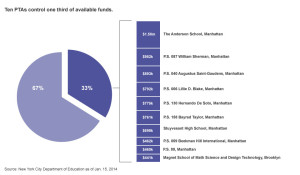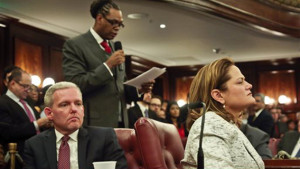As a City Council member, Dan Halloran of Queens, who leaves office next week, was an outlier in every way. Halloran was one of just four Republicans in the council, a libertarian in the Ron Paul mold. He is a practicing pagan and prince of his tribe. He reached peak attention in the council for claiming — on the basis of nothing — that sanitation workers deliberately stalled their plows in the 2010 blizzard. And Halloran co-starred in a political corruption indictment earlier this year, with federal prosecutors alleging that Halloran helped bribe Republican county leaders to allow State Sen. Malcolm Smith onto the ballot for mayor; the feds also charged that Halloran promised council funding to prospective donors to his congressional campaign. Halloran has asked Judge Kenneth Karas of the U.S. District Court for the Southern District of New York to dismiss the indictment, a request that is still being reviewed.
In mundane moments in office, Halloran was a player in participatory budgeting and redistricting, and a dissenting voice on government interference in New Yorkers’ private lives, like the recent law raising the smoking age to 21.
The New York World sat down for a conversation with Halloran just before the final meeting of the full New York City Council last Thursday.

Councilmember Dan Halloran, center, was an outlier in every way. Photo: Sebastien Malo
What’s on your mind before your last stated meeting?
Dan Halloran: Well, I’m concerned for the speaker’s race that’s going on right now…. I’m concerned that the city of New York may not be able to fiscally weather four years of having both a left-leaning mayor and a very left leaning speaker.
But what I mean is also how does it feel on a personal level to exit the council?
Well, it’s difficult. I, I gave up a lot of emotional energy in doing this job. In fact I think I spent more than most of my colleagues on the ground in my district. But at the same token it feels a relief because I will be able to get back to have a private life, to do things in my private life to earn money, to make a better future so to speak for myself, and those things you didn’t have the opportunity to do while you were on the council.
Politics can be very formulaic, and you’ve taken a different approach. Did you factor into that calculation that seeming eccentric might actually turn to your disadvantage?
Look, I mean, you don’t go out to be eccentric; you go out to articulate positions…. There’s career politics, and career politics is formulaic, is driven by county machines, it’s something that very much is beholden to a rank-and-file approach to government, and I don’t think that’s what our founders ever intended. I think that the republic is in danger when we have things like that because that form of conformity is what is stifling the free exchange of ideas.
You’ve been mocked a lot in the media, perhaps in some instances unfairly. I’m thinking in particular about the Queens Tribune front-page headline that said ‘Pagan Lord’.
Could you imagine a newspaper in America putting “Orthodox rabbi” as the lead story? Or “Muslim imam” as the lead story? They wouldn’t do it. And that’s sort of the political philosophy behind statism, you want conformity, you want everyone to play in the same sandbox, and you punish the outsiders.
Has that ever made you think, ‘Maybe I shouldn’t be a politician’?
No, still here. Because if you give up they’ve won. And I don’t mean that the media itself as an entity has won. I just mean that if you’re not gonna stand up for your own positions, no one else is going to. So you have to be willing to take that into your own hands.
Are you leaving politics for good or do you plan on returning?
Oh geez. That’s that question right? I will give you the James Bond answer. Never say never. But by the same token I can tell you that at least for the short term I am in a position where I have to worry about job, career kind of thing first, and then I can focus on anything else.
There will be one fewer Republican, from four to three, in the new council. Do you feel responsible for this?
I feel that my circumstances hurt the party and the city in that respect. Unintentionally of course, but nonetheless. A responsibility is definitely there. And it’s unfortunate that the next four years there would not be as loud a Republican voice as there could have been. But we had opportunities; there were other districts where Republicans came close.
Does that weigh on your conscience?
It does, I mean it weighs on my conscience to the extent that would have, should have, could have. But you still have to, you have to go forward, and I didn’t run those races, the pickups weren’t there to be have. And unfortunately in my opinion the party did not chose the best candidate to run to replace me. And so it lost the seat.
There have been a lot of serious troubles in the Republican Party in Queens. It appears from the outside it’s either lost its moral compass or the trust of the public. How can that be fixed?
I think that the only way your fix that is by solidly addressing the issues of the people. And I tried to do that in my four years in office. But we don’t have a state senator who is a Republican, we don’t have an assemblyman. Clearly there is a deficit now. And as the political winds have shifted in New York City towards Democrats all across the board, I think you’re gonna find it’s harder and harder as gerrymandering takes place in the redistricting process, it will make it almost impossible for Republicans to get elected absent something radical happening.
Should council members who’ve been convicted on charges of corruption be stripped of their pensions?
It would depend on law. There’s both state civil service law, as well as local law. So you have to look to the law and if it needs to be reformed you have to change it. I think post conviction, absolutely there is an opportunity if that the crux of the pension. Many, many of these politicians were in government in other forms beforehand. That’s not really fair to strip them of a pension that they already earned and are vested in, say the police department or the fire department, because they went into public service and, whatever happened happened.
There’s been a lot of talk about you scuba diving. Why do you like scuba diving so much?
I do a lot of wreck diving, so it’s the archeology and history side of things, and the geology side of things. I’ve done cape diving and what not. I like the history, to be able to see 100 years looking back into the lens.
You famously said [on an FBI wire] that there is no politics without money. Tell me about it.
That’s the problem. Look, the bottom line is that to get elected in the city of New York you need money. And our campaign finance system, while it’s a nice attempt, is a joke. Not because it’s not well intentioned, but because in application it can’t work. If you’re a Democrat and there’s a six-to-one voter registration, no amount of money I’m gonna throw at this as a Republican is going fix that deficit. The reality is that you need hundreds of thousands of dollars to do mailers, to do TV, to do radio, it’s just not practical unless you’re either well financed personally, meaning you’re rich, or you’re the county Democratic machine is behind you. So what are your options? The reality of that statement, which is completely out of context, is that in order to get into government to fix problems, you have to have enough money to get into government. Well, isn’t that the whole problem from the get-go?
Additional reporting by Emmanuel Felton. This interview has been edited and condensed.









